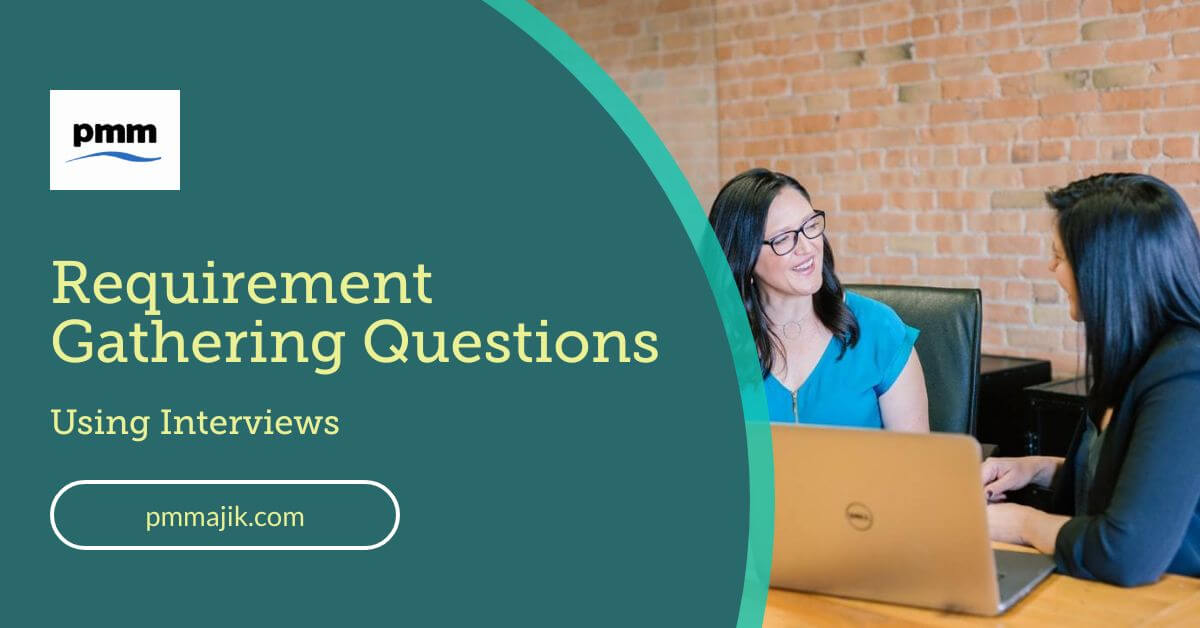Next to feature in our series of requirement gathering articles is interviews.
Interviews are perhaps the most common requirement gathering technique. They typically involve eliciting information from a person by asking questions and recording the answers.
They can be conducted in person, by telephone or online, making them a versatile requirement gathering tool.
In general, interviews are held with individuals or small groups; where larger groups are involved it is often more effective to hold a focus group or workshop.
Whilst a common and effective requirement gathering technique, don’t be fooled into thinking that interviews are a simple option. There is an art to interviews.
Types of interviews
Firstly, a few simple house-keeping measures should be put in place. When will the meeting take place? Where will the interview take place? Does a room need to be booked, or will it be held in a communal area?
Once this has been decided it is time to think about what questions will be asked, and how you will ask them. Interviews can take one of three forms:
Unstructured
Unstructured interviews tend to be informal and have a conversational tone. Questions aren’t decided in advance, rather the interviewer will probe the stakeholder to gain rich, in-depth information. Interviews of this type are effective when building rapport with a stakeholder, or when discussing sensitive topics, however, numerous rounds of interviews may be needed to gather all of the information needed.
Structured
The opposite to unstructured, structured interviews follow a rigid set of questions with no room for maneuverability. Having a list of comprehensive questions enables the interviewer to find out the exact information that they need, which can be advantageous in requirement gathering, since it is important to have a clear understanding of what the stakeholder requires. When a specific set of questions is asked without deviation however, there are no opportunities to probe the stakeholder further or explore other topics which may arise.
Semi-structured
Taking the best of both methods, semi-structured interviews allow the interviewer to have a guiding set of questions whilst allowing for additional probing of answers.
Semi-structured interviews allow great flexibility for the interviewer. Having guiding questions ensures that the interview stays on track and that all information required is elicited within one interview. It is unlikely that further rounds of interviews will be required as the interviewer can continue asking and probing until they are confident that they have all of the information needed.
Types of questions
Now the structure of the interview has been determined, it is time to decide on the type of questions that will be asked, the most common being open and closed.
Closed questions
Closed questions are used when a short, focused answer is required. Answers will be typically right or wrong, and they are effective in fact-finding scenarios. Examples of closed questions include:
- Yes or no questions
- A choice from a list of options
- Identification of a particular piece of information, for example, “What is your name?”
Open questions
In contrast, open questions allow for longer responses, which can elicit much more information. Typically, open questions will be preceded by, “Who, when, where, what, how?”
Loaded questions
Sometimes referred to as leading questions, this type of question is very subtle, and points the respondent to answer in a certain direction.
An example of a loaded question could be, “How do you find your current system works?” This very subtly leads the respondent to question how they find their current system and highlights that it may not work as well as it could.
In contrast, “Tell me how your current system works?” is much less loaded as it doesn’t hint that there may be any issues currently.
Recall and process questions
Questions can also fall into the recall and process categories.
Recall questions are simple memory questions, such as, “What system are you currently using?”
Process questions require deeper thought or analysis, such as, “What are the advantages and disadvantages of your current system?”
Rhetorical questions
Often humorous, rhetorical questions are used to promote thought and don’t require an answer. Asking rhetorical questions keeps the respondent engaged with the interviewer.
Funnelling
Funnelling questions start broadly and become more restrictive, finishing at a closed question. Or, alternatively, start at a closed question and become broader, ending in an open question.
These types of questions are effective in pinpointing or eliciting a particular idea.
Advantages of interviews
Carefully considering the type of interview and the questions asked, can prove to be advantageous in requirement gathering. The interviewer is able to gain report and build up trust with the stakeholder, which encourages them to answer questions openly and freely.
Unstructured and semi-structured interviews allow the potential for follow up questions or the re-wording of questions, which garners immediate feedback from the stakeholder.
Interviews, particularly face-to-face, also allow the interviewer to observe non-verbal clues, which can add further context to their answers.
Disadvantages of interviews
As we’ve said, interviews are an art-form, asking the wrong types of question or getting the structure wrong can result in ineffective answers. The interviewer should also spend time gathering background information, and, as such, the process can be time-consuming and require significant training.
Interviewing can also be a costly process, particularly if they are being conducted face-to-face in differing geographical locations. Cost can be circumvented by holding interviews online or by telephone, however this can result in missed non-verbal clues.
Even the best planned interview can be in vain if the human relation, personality and influencing skills of the interviewer are poor. Effective interviews depend upon rapport and the relationship between the interviewer and stakeholder. If that is missing, then the interview will not produce the results needed.
When deciding whether to use Requirement Gathering Questions for requirement gathering, it is vital to plan, plan, plan! Consider the type of interview structure and questions that will be most effective for getting the information required, and remember to build rapport with your stakeholders so that they feel at ease providing the information needed.






